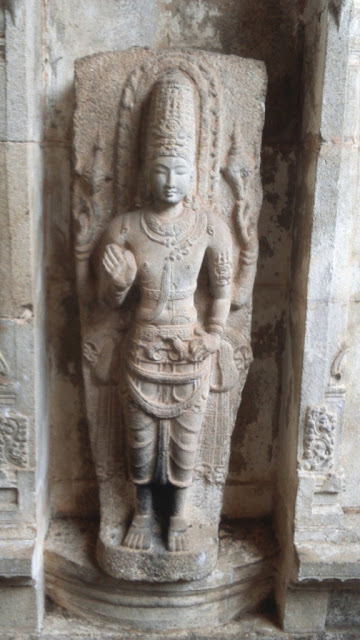Palvannanathar Temple, Tirukkazhippalai, Chidambaram –
The Temple
The Temple is having three tier Rajagopuram and is
facing east. This is a reconstructed / relocated temple. Earlier,
the place was called as Karaimedu, was on the northern bank of
Coloroon-Kollidam river, it was named Kazhipalai. Due to floods in
Kollidam, the temple was heavily ravaged. Then this temple was built
with Kazhipalai Lord and Mother. The original temple was 13 Kms from the
present place on the banks of Kollidam river. The temple is a small one
enshrining a small Shivalingam that is white in color. Lord Shiva in the temple
is a Swayambumurthy.
Presiding Deity is called as Palvannanathar and Mother
is called as Vedha Nayagi. Moolavar is small in size with a small “Kuzhi” on
top, in which abisheka milk is collected. Other abishekams are for Avudayar
only. Moolavar is in square shape and looks like Thulasi maadam. The Linga is
split due to the hit by a horse leg. Pujas are performed for this Linga only.
Lord Shiva and Mother Parvathi grace in their wedding posture behind the Linga.
Lord Bhairava in the temple has not his dog vehicle as
in Kasi. He appears with 27 skulls, wearing the sacred thread and a
serpent as belt around his waist and with turf and lion’s teeth. It is
said that the same sculptor who designed Bhairava idol in Kasi did it here
too. According to scriptures, worshipping Bhairava in this temple equals
the prayer at Kasi. The temple is known more as Bhairava temple. The
8th day after full moon day is (Ashtami in the new moon fortnight)
observed with special pujas.
Lord Nataraja appears with his turf roughly tied
over. Mother Sivakami graces with her friends (Thozhi) Vijaya and
Saraswathi. Adhikara Nandhi with his consort occupies both sides of the
entrance. Lord Vinayaka, Lord Muruga with his consorts Valli and
Deivanai, Mother Gajalakshmi, Lords Vishnu, Surya, Chandra, Brahmma, Bhairava, Agoramurthi,
Dakshinamurthy, Kirathamurthy, Nayanmars, Mothers Chatura Durga, Bhuvaneswari grace
from their shrines in the prakara. Inscriptions from the Imperial Chola
period are seen in this temple.



































